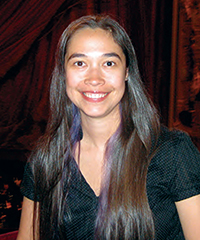 Why did you choose your specific health professional career?
Why did you choose your specific health professional career?
I was introduced to dentistry in high school while on a trip to Guatemala. I had the opportunity to travel with a medical and dental team from Oregon Health and Science University in Portland, Oregon. I always knew that I would work in an Indian community, I just wasn’t too sure how. Working with the dental team, I gained experience and thought, “Wow, I can do this at home with the Indian Health Service”. On a personal note, while in high school my focus was in the arts, particularly ceramics, so working with my hands was appealing.
What experiences did you have to make sure this profession was right for you?
After I graduated from high school, I moved to San Diego, CA and attended San Diego Mesa Community College. During my years there, I participated in the work-study program and got a position in the Dental Assisting Program as a teacher’s aide. While in San Diego, I volunteered at the urban Indian Health Clinic. Having these experiences helped to reaffirm my decision to pursue dentistry.
Describe any obstacles or barriers to success that you encountered along your health professional career path. How did you overcome them?
My two biggest challenges were academics and finances. When I moved to San Diego I was financially on my own. I was an out of state resident so cost of tuition was still high even for a community college. Academically, I was behind in both math and science. In addition to being at the community college level and not having a strong academic background, I was not a good candidate for scholarships. With this starting point, I had to put in the extra work to catch up. Starting at a community college was the best place for me to do that. I took remedial courses that gave me a chance to build a solid foundation for my pre-dental coursework. I started getting good grades which was great for my GPA and my self-confidence. I also worked throughout college and fortunately I had good time management skills to handle the hours. However, I did not do much outside of work and school since these were my priorities. I used holidays and breaks as a time to pick up extra work hours since I couldn’t afford trips to travel home.
What do you do in your current job?
I love my work as a general dentist, because I get the chance to do a little bit of everything. Each day the schedule is different. Some days I work in the emergency clinic doing tooth fillings or teeth extractions. Other days I get to do root canals, exams/check-ups, or work with kids. Since I work in a large urban facility, I do not get the chance to do as much prevention or education that I would do if I were in a community, and I miss that.
What advice do you have for American Indian/Alaska Native students who are interested in health careers?
Get experience either by job shadowing or volunteering. If you are considering a job within the Indian Health Service, take the chance to go there specifically. Map out your academic plan, and then take it one step at a time. It took me three years to finish my math requirement for calculus because I had to start with elementary math. It may have taken me longer than most of my colleagues, but I had to be realistic of where I was academically and then plug away.
What would you like to see for your tribe’s future?
I would like to see us become healthier people by being more pro-active in our everyday decisions. We have got to embrace what is good in our communities and empower ourselves. It all starts from within each of us and within our homes.
Do you practice traditional medicine? If you do, then how does traditional medicine interact with conventional medicine?
As a dentist I do not practice traditional Indian medicine. However, I am involved with the Phoenix Indian Medical Center’s Traditional Cultural Advocacy Program. Our program helps to facilitate interactions between patients and providers of traditional Indian medicine and to educate our staff on issues of traditional Indian medicine, especially as it relates to western/conventional medicine.

